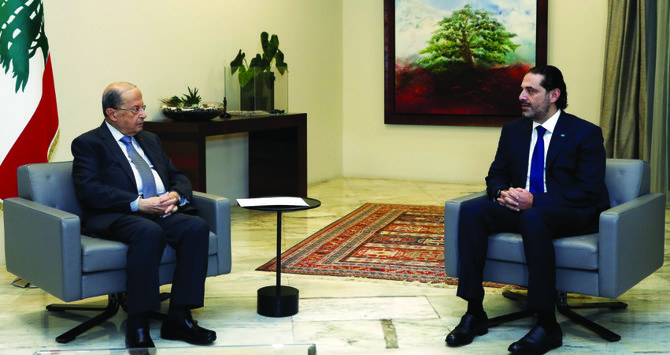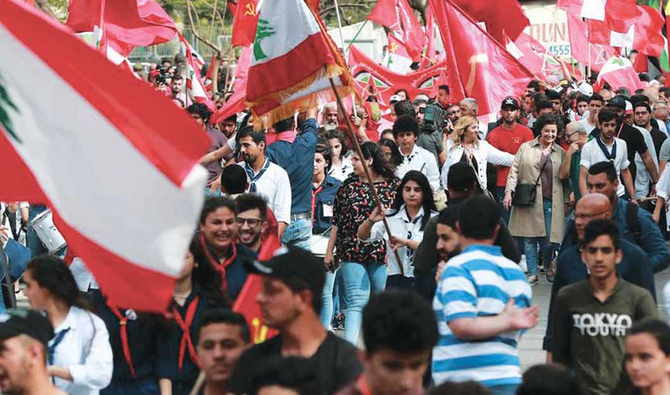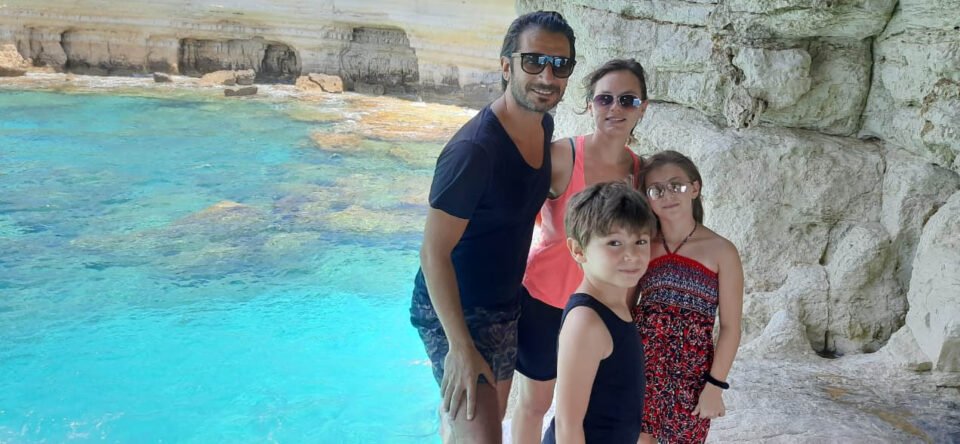By ASSOCIATED PRESS LEIDSCHENDAM, Netherlands — A United Nations-backed tribunal sentenced a member of the Hezbollah militant group to life in prison Friday for his involvement in the 2005 assassination of former Lebanese Prime Minister Rafik Hariri. The defendant, Salim Ayyash, has never been arrested and was not in court at the Special Tribunal for […]

by NAJIA HOUSSARI — arabnews — BEIRUT: Hopes that Lebanese Prime Minister-designate Saad Hariri’s new government would be confirmed quickly were dashed on Thursday when President Michel Aoun presented his own counter-proposal to Hariri’s suggested Cabinet lineup of 18 ministers. Hariri stressed that he had selected “specialists with no partisan affiliations.” Mustafa Alloush, the vice president of Hariri’s Future Movement party, said: “Hariri has carried out his constitutional duties, and the ball is now in the court of the president and his team, especially his brother-in-law, the head of the Free Patriotic Movement, MP Gibran Bassil.” However, a statement issued by the Presidency of the Republic after Aoun’s meeting with Hariri said that Aoun “handed Hariri in return an integrated government proposal which includes a distribution of portfolios based on clear principles.” This indicates, according to commentators, that Lebanon’s “political dispute remains unchanged.”
Alloush said: “Hariri submitted an integrated government lineup of independent, nonpartisan ministers. It represents most of the sectarian components and respects the unity of standards as the political forces demanded, but it seems that President Aoun’s team, and especially Bassil, insist on being the obstructing third of the government while keeping specific ministries, such as the Ministry of Energy, and this is what Hariri did not and will not accept.” He added: “Hariri suggested Shiite ministers that would provoke neither Hezbollah nor the Amal movement.” Sources close to Aoun said that the president was “surprised that Hariri named all the ministers, including Christians, without consulting him.”
ZEINA KARAM — BEIRUT (AP) — The Lebanese prosecutor probing last summer’s port explosion in Beirut filed charges on Thursday against the caretaker prime minister and three former ministers, accusing them of negligence that led to the death of hundreds of people, Lebanon’s official news agency said. The four are the most senior individuals to be indicted so far in the investigation, which is being conducted in secrecy. And though it is too early to predict whether any of the four would end up on trial, the development was significant in Lebanon, where a culture of impunity has prevailed for decades, including among the entrenched political elites. Judge Fadi Sawwan, the prosecutor responsible for the investigation, filed the charges against Hassan Diab and former Finance Minister Ali Hassan Khalil, as well as Ghazi Zeiter and Youssef Fenianos, both former ministers of public works. All four were charged with carelessness and negligence leading to death over the Aug. 4 explosion at Beirut’s port, which killed more than 200 people and injured thousands.
The explosion was caused by the ignition of a large stockpile of explosive material that had been stored at the port for six years, with the knowledge of top security officials and politicians who did nothing about it. Anger has been building up over the slow investigation, lack of answers and the fact that no senior officials have been indicted. About 30 other security officials and port and customs officials have been detained in the probe so far. Diab is a former professor at the American University of Beirut who became prime minister late last year. Although he served as minister of education from 2011-14, he is considered to be an outsider to the political ruling class that has run Lebanon since the end of the 1975-90 civil war. Since the shipment of ammonium nitrates arrived in Lebanon in late 2013, four prime ministers have been in office. It was not clear why Sawwan has singled out Diab, who was prime minister for less than a year among the ex-premiers who have held the post while the nitrates were improperly stored at a port warehouse, a ticking bomb.

by NAJIA HOUSSARI – arabnews — BEIRUT: Thousands of public and private-sector workers in Lebanon are expected to down tools next week in a national strike over crippling government spending cuts. Members of the country’s General Labor Union, which includes 43 unions and federations, will join a walkout on Wednesday in protest at the latest austerity measures. Union leader, Bechara Al-Asmar, told Arab News: “This national strike is the beginning of the broadest moves the country will witness against the removal of state subsidies for basic materials. “We are shouting in everyone’s face. We cannot stand by. If they (the country’s political leaders) form a government, there is no need to strike, but what is happening is further deterioration. “The poverty rate in Lebanon, according to international statistics, has reached 75 percent, and these people receive 1 million (Lebanese) pounds ($660), which is no longer sufficient to pay an electricity bill, while the extreme poverty rate has risen to 40 percent. “In the tourism sector alone, the total number of people who have lost their jobs has reached 110,000, and if banks implement the Central Bank’s circular for merging, 10,000 employees will become unemployed and there will be no job opportunities for them in light of the closure of other institutions,” Al-Asmar said.
There were angry street protests in Sidon following an announcement by Ali Ibrahim, head of the Union of Bakeries Syndicates, that the state had stopped subsidizing flour. Demonstrators blocked main roads and in Hermel tires were set alight outside the government palace. One protester told Arab News: “I used to buy a thyme pie (a cheap popular food) for 1,000 Lebanese pounds. Today, after announcing the lifting of subsidies, they went up to 2,500 pounds. How can the poor survive? What awaits us next?” During a press conference, Shadi Al-Sayed, head of the Public Drivers Syndicate in northern Lebanon, said: “The spark of anger will be from Tripoli if the ruling authority in Lebanon decides to kill the citizen in his livelihood.” He warned of street protests until “matters returned to normal.”
by middleeastmonitor.com — Lebanon’s central bank asked domestic banks on Wednesday to comply with a new law allowing students abroad to transfer dollars out of Lebanon as they struggle to pay daily expenses without access to their money, Reuters reports. Thousands of university students around the world have been caught up in Lebanon’s financial meltdown, […]
![AUB will adopt an exchange rate of 3,900 Lebanese pounds to the US dollar [File: Aziz Taher/Reuters]](https://www.aljazeera.com/wp-content/uploads/2020/11/2020-05-08T000000Z_1608515574_RC2DKG91B4JY_RTRMADP_3_LEBANON-CRISIS-AUB.jpg?resize=770%2C513)
Al Jazeera — Timour Azhari — Beirut – Lebanon’s prestigious American University of Beirut (AUB) has announced that it will more than double the cost of tuition in the local currency, saying the move was necessitated by the country’s spiralling economic collapse. The university will adopt an exchange rate of 3,900 Lebanese pounds to the US dollar, officially untethering from Lebanon’s 23-year-old official rate of 1,500 Lebanese pounds per dollar. AUB President Fadlo Khuri said the university had made the decision in June but held off in the hope that Lebanon’s leaders would implement reforms to unlock international aid that could stabilise the country’s currency, which has lost about 80 percent of its value since mid- 2019. “We delayed it as far as we can, hoping for an economic rescue of Lebanon as a country and some kind of sustainable plan … clearly that’s not imminent,” Khuri said in a briefing with journalists on Monday.
The new rate mirrors one of Lebanon’s three main exchange rates; a semi-official one set by the central bank for commercial bank transactions. At the official rate, yearly tuition of approximately $24,000 equated to 36 million pounds. When the new rate goes into force this spring, it becomes 93.6 million pounds. The minimum wage in Lebanon is just 675,000 pounds a month, or 8.1 million per year. That renders AUB inaccessible to the vast majority of youth in a country where more than 50 percent are poor, and casts uncertainty over the ability of thousands of students, many formerly considered middle class, to complete their studies at one of the Middle East’s top universities. Even before the tuition hike, Khuri said 250 of some 9,400 students at the university had halted their studies, while 600 incoming students had ultimately decided not to start. AUB expects more to leave now, but does not know how many, Khuri said.

BEIRUT (Reuters) – Lebanon’s caretaker government agreed on Tuesday that subsidies on bread and essential medicine should be kept, as the country’s financial meltdown sends poverty and inflation soaring. At a meeting on subsidy rationing with the central bank governor and an advisor to the president, ministers pledged to draft a plan within a week that would help cut spending while keeping support for some basic goods. With foreign reserves dwindling fast and an end to subsidies looming, Lebanon’s leaders have yet to make any substantive moves towards a plan to back imports or help the country’s most vulnerable. Politicians have bickered for months over the formation of a new government as Lebanon hurtles towards what U.N. agencies have warned will be “a social catastrophe”. A statement from Caretaker Prime Minister Hassan Diab’s office said attendees had agreed at Tuesday’s meeting to study means for reducing the oil bill and providing ration cards. The crisis has already doomed at least half the population to poverty.
A COVID-19 surge and the huge blast at Beirut port, which killed 200 people in August and prompted the cabinet to resign, have piled hardship on the Lebanese. Comments about the removal of subsidies have triggered panic buying in recent months, raising fears of food shortages and growing hunger. Governor Riad Salameh said last week the central bank could only keep subsidies for two more months. As dollar inflows dried up, the central bank has drawn on already critical foreign reserves to subsidise three key commodities – wheat, fuel and medicine – and a basket of basic goods. The central bank has provided hard currency to those importers at the old peg of 1,500 Lebanese pounds to the dollar as the currency crashed by nearly 80% since last year. Critics, including the World Bank last week, have blamed the ruling elite for failing to chart a path out of the crisis since it erupted more than a year ago.
by bbc –– Demonstrators burned tyres in the city centre, and some also attempted to reach the parliament building. The head of the country’s central bank earlier said the subsidies on flour, fuel and medicines could not continue beyond the next two months. UN agencies have warned of a social catastrophe for the poorest households. […]

by AFP — Lebanese security forces detained Ziad Takieddine last week at the request of Interpol. Prosecutor Ghassan Oueidat on Monday freed the 70-year-old under judicial supervision after “determining his place of residence, confiscating his passports and banning him from leaving Lebanese territory,” the source told AFP. Takieddine had fled to Beirut in June, when a French court condemned him to five years in jail in a case involving millions of euros in kickbacks from arms sales to Pakistan and Saudi Arabia signed in 1994. Lebanon would soon request France provide it with Takieddine’s legal file so it can review charges against him, the judicial source said.
If the charges were found to be justified, he could be tried in Lebanon as a Lebanese citizen, the source added. A French judicial source told AFP he was sceptical of the possibility of extradition to France. “France and Lebanon have not concluded an extradition agreement and Lebanon does not extradite its nationals. The proceedings could very quickly end there,” the source said. Takieddine was also once the main accuser in an inquiry into suspected Libyan financing of former French president Nicolas Sarkozy’s 2007 election campaign. The businessman was investigated in late 2016 after he told the media he had delivered millions of euros in cash from Libyan dictator Moamer Kadhafi.

by cyprus-mail.com — George Eid — After Lebanon’s drastic economic collapse and increasing financial strains, more and more Lebanese are leaving home. The Gulf and the US are popular destinations, but the first choice for many Lebanese is Cyprus or ‘the island’ as they call it. This what Dr Caesar Daoud did a few months back. The well-established 39-year-old physiotherapist and Chinese medicine doctor who owned four medical centres in Lebanon only last year, has closed down his businesses and moved to Cyprus with his family. “I decided to leave Beirut when the situation got worse. When it became unbearable. Although my parents decided to stay in Lebanon during the Lebanese civil war (1975-1990) I did not want my kids to go through the hardship I suffered in our country,” he told the Cyprus Mail.
Daoud is a father of two children, Nolan, six, and Malena, seven. He and his wife had to secure a school for them before making the move to Cyprus. “Lycee Franco Chypriote was our natural choice because Lebanon is a francophone country and we had our kids in a school that followed the French system,” he said. “Every time I drive my kids to school, I find around 10 Lebanese at least waiting for their kids and talking about current issues in Lebanon. My kids adapted easily at this school because both of them had Lebanese kids in their class.” Schools following the French educational or strong in French are an obvious choice for the Lebanese. “Schools such as Lycee Franco Chypriote, Lycee Pascal and American Academy are the main target of Lebanese families moving to Cyprus. They inquire about these three schools before moving to the island,” Panayiotis Frangou from D Frangou immigration consultants Ltd told the Cyprus Mail. “The number of Lebanese wanting to move to Cyprus is huge. I really mean huge.” He said he had seen a 70 per cent of increase in Lebanese costumers this year alone. “Before 2020 most of the Lebanese were seeking a Cypriot residency permit for backup, but now they are seeking permanent residency to settle on the island.” “Cyprus is a great choice” Daoud said, explaining that he can travel easily back and forth to Lebanon where his parents still live. But it is also a gateway to the Arab world and to the Arab Gulf where he opened a clinic as well.




